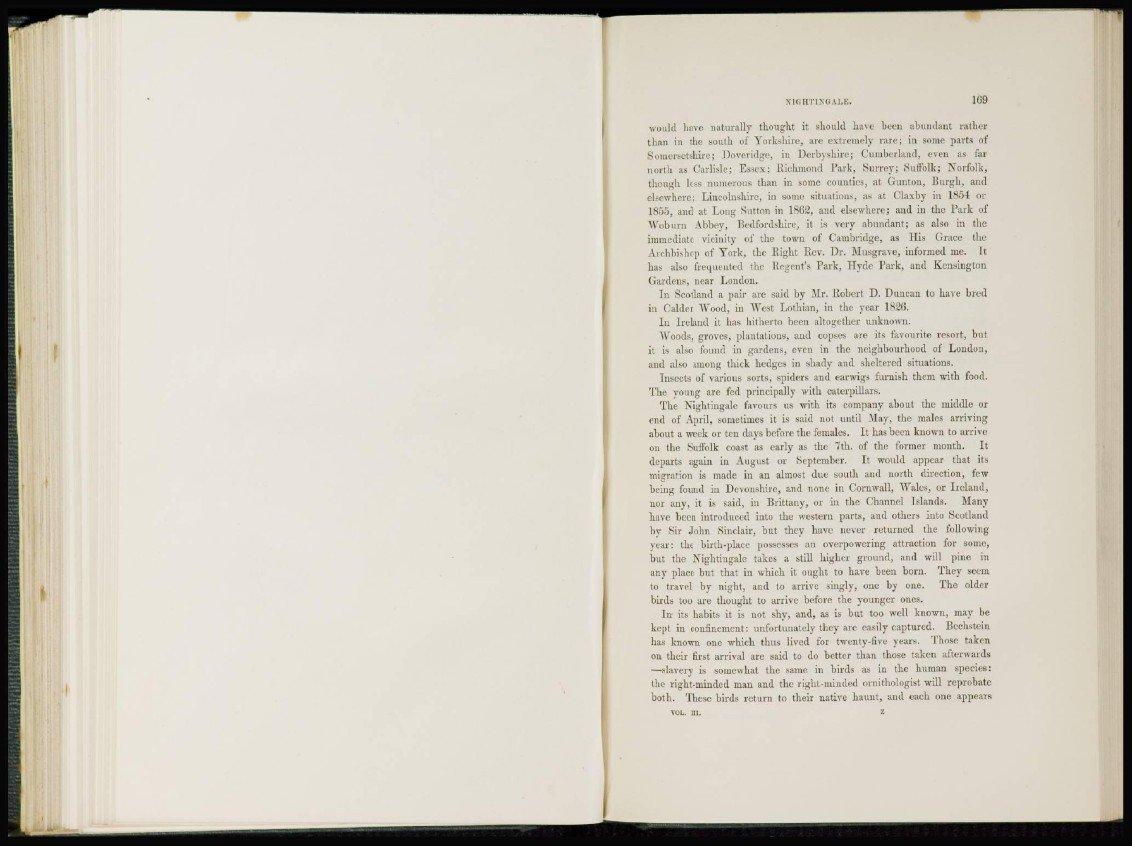
NIGHTINGALE. 169
would have naturally thought it should have been abundant rather
t h a n in the south of Yorkshire, are extremely rare; in some parts of
Somersetshire; Dnvcridge, in Derbyshire; Cumberland, even as far
north as Carlisle; Essex; Richmond Park, Surrey; Suffolk; Norfolk,
though less numerous than in some counties, at Gunton, Burgh, and
elsewhere; Lincolnshire, in some situations, as at Claxby in 1854 or
1855, and at Long Sutton in 1862, and elsewhere; and in the Park of
Wbb urn Abbey, Bedfordshire, it is very abundant; as also in the
immediate vicinity of the town of Cambridge, as His Grace the
Archbishop of York, the Right Rev. Dr. Musgrave, informed me. It
has also frequented the Regent's Park, Hyde Park, and Kensington
Gardens, near London.
I n Scotland a pair are said by Mr. Robert D. Duncan to have bred
in Calder Wood, in West Lothian, in the year 1H°.6.
I n Ireland it has hitherto been altogether unknown.
Woods, groves, plantations, and copses are its favourite resort, but
it is also found in gardens, even in the neighbourhood of London,
and also among thick hedges in shady and sheltered situations.
Insects of various sorts, spiders and earwigs furnish them with food.
The young are fed principally with caterpillars.
The Nightingale favours us with its company about the middle or
end of April, sometimes it is said not until May, the males arriving
about a week or ten days before the females. It has been known to arrive
on the Suffolk coast as early as the 7th. of the former month. It
departs again in August or September. It would appear that its
migration is made in an almost due south and north direction, few
being found in Devonshire, and none in Cornwall, Wales, or Ireland,
nor any, it is said, in Brittany, or in the Channel Islands. Many
have been introduced into the western parts, and others into Scotland
by Sir John Sinclair, but they have never returned the following
year; the birth-place possesses an overpowering attraction for some,
but the Nightingale takes a still higher ground, and will pine in
any place but that in which it ought to have been born. They seem
to travel by night, and to arrive singly, one by one. The older
birds too are thought to arrive before the younger ones.
I n its habits it is not shy, and, as is but too well known, may be
kept in confinement: unfortunately they arc easily captured. Bechstein
has known one which thus lived for twenty-five years. Those taken
on their first arrival are said to do better than those taken afterwards
—slavery is somewhat the same in birds as in the human species:
the right-minded man and the right-minded ornithologist will reprobate
both. These birds return to their native haunt, and each one appears
VOL. III. Z.